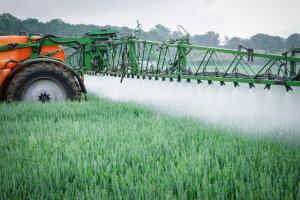
Agrochemical Market is Anticipated to Reach USD 310 Billion, at a CAGR of 2.32% CAGR by 2032
The Global Agrochemical Market is experiencing several significant trends driven by the need for increased agricultural productivity and sustainability.
FRANCE, FRANCE, UNITED KINGDOM, January 14, 2025 /EINPresswire.com/ -- Agrochemical Market Size was estimated at 252.1 (USD Billion) in 2023. The Agrochemical Market Industry is expected to grow from 257.95(USD Billion) in 2024 to 310.0 (USD Billion) by 2032. The Agrochemical Market CAGR (growth rate) is expected to be around 2.32% during the forecast period (2025 - 2032).The global agrochemical market has been experiencing significant growth, driven by the increasing demand for food, the need for improved agricultural productivity, and advancements in farming techniques. Agrochemicals, encompassing fertilizers, pesticides, herbicides, and plant growth regulators, play a pivotal role in modern agriculture by enhancing crop yield and quality.
The agrochemical market is an integral component of the agricultural sector. It supports farmers in addressing the challenges of pests, diseases, and nutrient deficiencies in crops. According to recent market reports, the global agrochemical market size was valued at approximately USD 235 billion in 2023 and is projected to grow at a compound annual growth rate (CAGR) of 3.5% from 2024 to 2030. This growth is primarily fueled by the rising global population, urbanization, and decreasing arable land.
Key Drivers of the Agrochemical Market
Rising Global Population: The world population is expected to reach XX billion by 2050, leading to a proportional increase in food demand. Agrochemicals enable farmers to maximize crop productivity, meeting the rising food requirements.
Declining Arable Land: Urbanization and industrialization have reduced the availability of arable land, emphasizing the need for high-yield agricultural practices. Agrochemicals help optimize production on limited land resources.
Technological Advancements in Agriculture: Innovations such as precision farming and genetically modified crops have enhanced the efficacy of agrochemicals, making them more targeted and sustainable.
Government Support and Subsidies: Many governments worldwide provide subsidies and incentives to promote the use of agrochemicals, ensuring food security and boosting agricultural productivity.
Get Free Sample Copy of Report @ https://www.wiseguyreports.com/sample-request?id=647930
Challenges Facing the Agrochemical Market
Despite its significant contributions, the agrochemical market faces several challenges:
Environmental and Health Concerns: The excessive use of agrochemicals can lead to soil degradation, water contamination, and adverse health effects on humans and animals. These concerns have prompted stricter regulatory frameworks.
Stringent Regulations: Governments and international bodies have implemented stringent regulations to control the use of certain agrochemicals, impacting market dynamics.
High Development Costs: The research and development of new, environmentally friendly agrochemicals require substantial investment, posing a barrier for smaller companies.
Resistance Development: Overuse of pesticides and herbicides has led to the development of resistant pests and weeds, reducing the efficacy of these chemicals.
Market Segmentation
The agrochemical market can be segmented based on product type, application, and region:
By Product Type:
Fertilizers: Nitrogen-based, phosphate-based, and potash-based fertilizers dominate this segment.
Pesticides: Insecticides, herbicides, fungicides, and others.
Plant Growth Regulators: Compounds that influence the growth and development of plants.
By Application:
Cereal and Grains: The largest segment, driven by the global demand for staple foods.
Fruits and Vegetables: Rising health consciousness has increased the demand for high-quality produce.
Oilseeds and Pulses: Growing importance in biodiesel production and protein-rich diets.
By Region:
Asia-Pacific: The largest market, with countries like China and India leading in agricultural production.
North America: Driven by advanced farming techniques and high adoption of agrochemicals.
Europe: Focused on sustainable and organic farming practices.
Latin America and Africa: Emerging markets with significant growth potential.
Opportunities in the Agrochemical Market
Sustainable and Organic Products: There is a growing demand for bio-based agrochemicals that are eco-friendly and compatible with organic farming practices. Companies investing in the development of such products can tap into this lucrative market.
Precision Agriculture: The integration of digital technologies, such as IoT, AI, and drones, into agriculture enables the precise application of agrochemicals, reducing waste and environmental impact.
Expansion in Emerging Markets: Developing countries in Africa and Latin America present significant growth opportunities due to their increasing agricultural activities and adoption of modern farming practices.
Collaborative Research and Development: Partnerships between agrochemical companies, research institutions, and governments can accelerate innovation and address regulatory challenges.
Competitive Landscape
Fmc Corporation
Nufarm
UPL Limited
Basf
Sumitomo Chemicals
Corteva
Kumiai Chemical Industry
Wynca
Nutrients
Bayer
Dow
Adama
Mitsui Chemicals
Syngenta
China National Chemical Corporation
Buy Now @ https://www.wiseguyreports.com/checkout?currency=one_user-USD&report_id=647930
Future Trends in the Agrochemical Market
Digital Agriculture: The adoption of precision farming and digital tools will revolutionize the application of agrochemicals, ensuring optimal usage and minimizing environmental impact.
Bio-based Agrochemicals: The shift towards sustainable farming practices will drive the demand for biological products, including biopesticides and biofertilizers.
Integrated Pest Management (IPM): IPM strategies that combine agrochemicals with cultural and biological methods will gain prominence.
Focus on Climate Resilience: Developing agrochemicals that enhance crop resilience to climate change and extreme weather conditions will be a key area of focus.
Regional Expansion: Emerging markets will witness increased investment in agrochemical infrastructure, driving regional growth.
Related Reports
lubricant packaging market https://www.wiseguyreports.com/reports/lubricant-packaging-market
Tms For Freight Forwarder Market https://www.wiseguyreports.com/reports/tms-for-freight-forwarder-market
Discrete Manufacturing and PLM Market https://www.wiseguyreports.com/reports/discrete-manufacturing-and-plm-market
Air Purifiers With Filters Market https://www.wiseguyreports.com/reports/air-purifiers-with-filters-market
Biorefinery Plants Market https://www.wiseguyreports.com/reports/biorefinery-plants-market
construction paints and coatings market https://www.wiseguyreports.com/reports/construction-paints-and-coatings-market
low grade silica sand market https://www.wiseguyreports.com/reports/low-grade-silica-sand-market
WiseGuyReports (WGR)
WISEGUY RESEARCH CONSULTANTS PVT LTD
+ + +1 628-258-0070
email us here
Distribution channels: Chemical Industry
Legal Disclaimer:
EIN Presswire provides this news content "as is" without warranty of any kind. We do not accept any responsibility or liability for the accuracy, content, images, videos, licenses, completeness, legality, or reliability of the information contained in this article. If you have any complaints or copyright issues related to this article, kindly contact the author above.
Submit your press release
